Characteristics
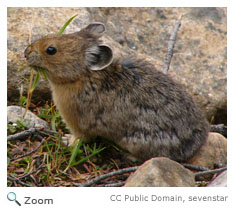 The American pika has a small, round body, peppery brown fur, large round ears and no visible tail. It is between six and eight inches long and weighs about six ounces. The American pika has a small, round body, peppery brown fur, large round ears and no visible tail. It is between six and eight inches long and weighs about six ounces.
Range
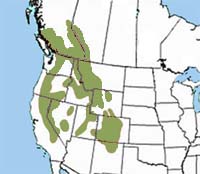 The American pika can be found in western North America from central British Columbia in Canada to Oregon, Washington, Idaho, Montana, Wyoming, Colorado, Nevada, California and New Mexico. The American pika can be found in western North America from central British Columbia in Canada to Oregon, Washington, Idaho, Montana, Wyoming, Colorado, Nevada, California and New Mexico.
Habitat
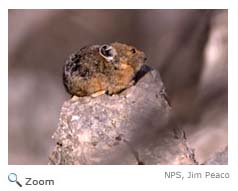 The American pika lives in rocky mountain areas and boulder-covered hillsides, usually at elevations of between 8,000-13,000 feet. It makes its home in talus slopes (rock and boulder piles) at the base of cliffs. Although pikas live in groups, they are territorial and guard and defend their own area from other pikas. In the winter, the American pika stays in tunnels in the rock piles. The American pika lives in rocky mountain areas and boulder-covered hillsides, usually at elevations of between 8,000-13,000 feet. It makes its home in talus slopes (rock and boulder piles) at the base of cliffs. Although pikas live in groups, they are territorial and guard and defend their own area from other pikas. In the winter, the American pika stays in tunnels in the rock piles.
Diet
 The American pika is a plant-eater. It eats a variety of green plants like grasses, sedges, thistles and fireweed. It will eat some food on the spot and it will carry some food away and store in a pile or "haystack." The American pika is a plant-eater. It eats a variety of green plants like grasses, sedges, thistles and fireweed. It will eat some food on the spot and it will carry some food away and store in a pile or "haystack."
A pika haystack can contain as much as a bushel of plant matter. The pika will often move the pile to protect it from rain or to find a better drying spot. After the vegetation dries, the pika will move it to its den deep in the rocks. The pika is active all year. It will eat food it has stored in the winter. If its supply runs low, it will forage for lichen and cushion plants. |
|
Life Cycle
The pika first mates about one month before the snow starts to melt. Mating season typically runs from late April to early July. The female gives birth to two to four babies in the spring. The babies are weaned in about three to four weeks. The babies will leave their mother after four weeks and are adult size in about three months. The female may then mate again and have a second litter.
Behavior
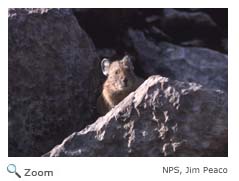 The American pika is diurnal, or active in the day. It spends most of the day foraging for food; guarding its territory; watching for predators like eagles, hawks, coyotes, bobcats, foxes, and weasels and sunning itself on the rocks.
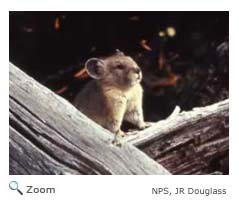 The pika is a very vocal animal. It uses both call and song vocalizations. The call is used to warn other pikas of a predator or intruder and it sounds a little like the bleat of a goat. The song is used mostly by the males during mating season, although the females will use the call in the fall.
|